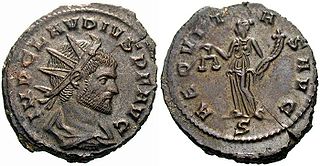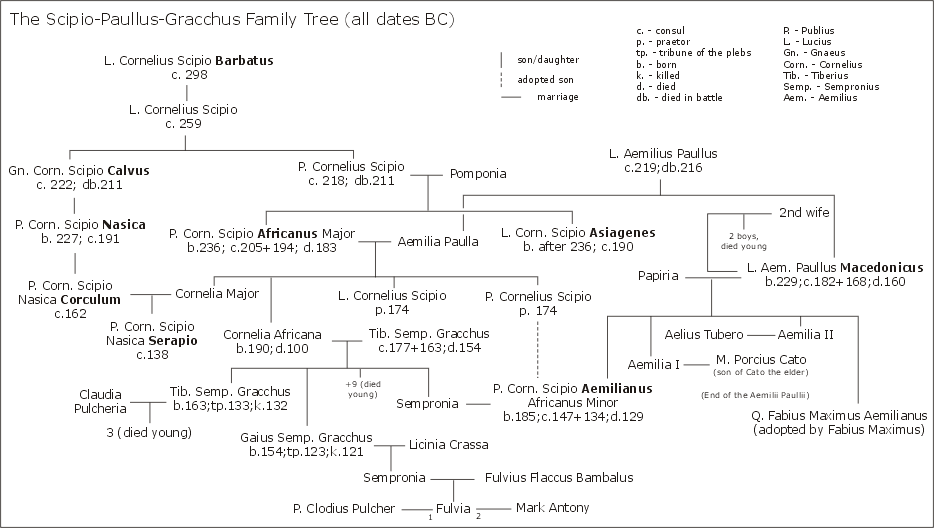This page is based on this
Wikipedia article Text is available under the
CC BY-SA 4.0 license; additional terms may apply.
Images, videos and audio are available under their respective licenses.

Aequitas is the Latin concept of justice, equality, conformity, symmetry, or fairness. It is the origin of the English word "equity". In ancient Rome, it could refer to either the legal concept of equity, or fairness between individuals.

Lucius Aemilius Paullus was a Roman consul twice, in 219 and 216 BC.
The ovation was a form of the Roman triumph. Ovations were granted when war was not declared between enemies on the level of nations or states; when an enemy was considered basely inferior ; or when the general conflict was resolved with little or no danger to the army itself.
Publius Mucius Scaevola was a prominent Roman politician and jurist who was consul in 133 BC. In his earlier political career he was tribune of the plebs in 141 BC and praetor in 136 BC. He also held the position of Pontifex Maximus for sixteen years after his consulship and died circa 115 BC.
Thomas Robert Shannon Broughton, FBA was a Canadian classical scholar and leading Latin prosopographer of the twentieth century. He is especially noted for his definitive three-volume work, Magistrates of the Roman Republic (1951-1986).
Gaius Livius Marcus Aemiliani f. Marcus n. Drusus was a Roman politician who was consul in 147 BC, together with Scipio Aemilianus.
Publius Cornelius Scipio Nasica Corculum was a politician of the Roman Republic. Born into the illustrious family of the Cornelii Scipii, he was one of the most important Roman statesmen of the second century BC, being consul two times in 162 and 155 BC, censor in 159 BC, pontifex maximus in 150 BC, and finally princeps senatus in 147 BC. Apart from his family network, he owed his success to his military skills, as he played a decisive role during the Battle of Pydna in 168 BC, and later won a triumph over the Dalmatae in 155 BC. Corculum was remembered as a staunch conservative, defender of the ancestral Roman customs against political and cultural innovations, notably Hellenism. In spite of his political influence, he could not prevent his rival Cato the Elder from gathering enough support in the Senate to declare the final war on Carthage in 149 BC. At this occasion, Corculum clashed with his famous cousin Scipio Aemilianus, who destroyed Carthage in 146 BC.
Quintus Fabius Maximus Allobrogicus, was a Roman statesman and general who was elected consul in 121 BC.
Tiberius Claudius Nero was a consul of the Roman Republic in 202 BC. He was the great-grandson of Appius Claudius Caecus.
Gaius Aquillius Florus was a consul of the Roman Republic in the year 259 BC. His colleague was Lucius Cornelius Scipio.

Quintus Caecilius Metellus Pius Cornelianus Scipio Nasica, in modern scholarship often referred to as Metellus Scipio, was a Roman consul and military commander in the Late Republic. During the civil war between Julius Caesar and the senatorial faction led by Pompeius Magnus, he remained a staunch optimate. He led troops against Caesar's forces, mainly in the battles of Pharsalus and Thapsus, where he was defeated. He later committed suicide. Ronald Syme called him "the last Scipio of any consequence in Roman history."
Lucius Valerius Flaccus was a consul of the Roman Republic in 195 BC and censor in 183 BC, serving both times with his great friend Cato the Elder, whom he brought to the notice of the Roman political elite.
Quintus Minucius Thermus was a consul of the Roman Republic in 193 BC.

Gnaeus Fulvius Maximus Centumalus was a military commander and politician from the middle period of the Roman Republic, who became consul in 298 BC. He fought in the final wars against the Etruscans and later led armies in the Third Samnite War. He was appointed dictator in 263 BC with responsibility for overseeing the start of the Roman ship building effort in the First Punic War.
Lucius Aurelius Cotta was a Roman magistrate, tribune of the plebs in 154 BC, and consul in 144 BC.
Gaius Fannius Strabo was a Roman republican politician who was elected consul in 122 BC, and was one of the principal opponents of Gaius Gracchus. He was a member of the Scipionic Circle.
The gens Matiena was a plebeian family at Rome. Members of this gens first appear in history in the time of the Second Punic War.
Titus Manlius Torquatus was a politician of the Roman Republic, who became consul in 165 BC. Born into a prominent family, he sought to emulate the legendary severity of his ancestors, notably by forcing his son to commit suicide after he had been accused of corruption. Titus had a long career and was a respected jurist; he also served as ambassador to Egypt in 162 BC.





